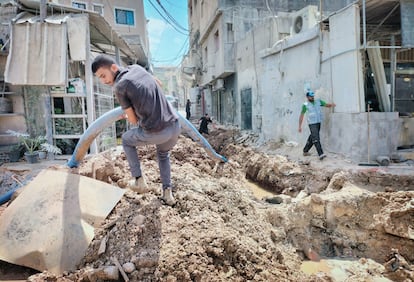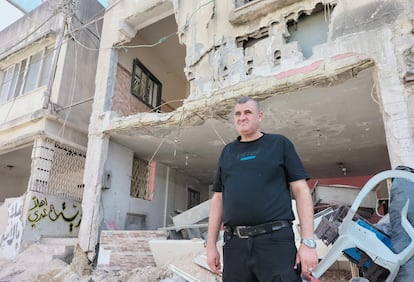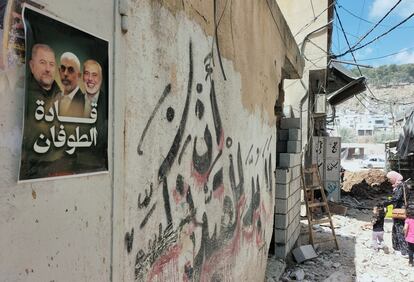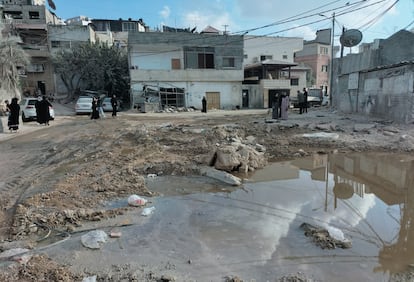Abu Shujaa, the armed idol of Tulkarem assassinated by Israel on the sixth attempt. ‘They listened to him more than the president’
The death of the respected militant leader highlights the vicious cycle in the West Bank and the discrediting of Mahmoud Abbas’ Palestinian Authority


Israel had tried to assassinate him five times. On the sixth attempt, on August 29, it succeeded; there are few lips that do not pronounce his name in the Nur Shams refugee camp. Abu Shujaa was much more than one of the over 20 people killed in the Israeli military offensive in the West Bank, one of the largest of the past two decades. Even more than his title: since 2022, Shujaa had been the leader of the Tulkarem Brigade of the armed wing of Islamic Jihad. “People listened to him more than Abu Mazen,” says Samer Yaber, the father of the deceased, in reference to the discredited president of the Palestinian Authority (PA), Mahmoud Abbas, for whom he works. He speaks with composure, along with a dozen men who nod and accompany him in mourning, drinking water and sitting on plastic chairs. It is the closest thing to a café in this maze of streets where workers and residents repair the walls of the bombed-out houses and the streets razed by the passage of bulldozers.
Abu Shujaa’s family history illustrates, like few others, the bloody downhill slide of the Middle East conflict over the past quarter-century. His grandfather came from the city of Haifa. He is one of the refugees of the Nakba — the flight or expulsion of some 750,000 of the one million Palestinians living in present-day Israel between 1947 and 1949 — who ended up in Nur Shams, near the city of Tulkarem. His father, now 49, joined the police force of the newly created PA in the 1990s, the pseudo-government in parts of the West Bank created by the Oslo Accords. “Honestly, at that time everyone had the same opinion: that the PA was here to end the occupation. After a while, we realized that they were here to fight us,” he says.

The optimism was short-lived: in 1994, an ultra-nationalist settler opened fire in the Ibrahim Mosque in Hebron during prayers, causing a massacre that led to a wave of Palestinian suicide bombings. Another Jewish radical assassinated Yitzhak Rabin in 1995 — the prime minister who had wanted to “give peace a chance” — and Israel expanded Jewish settlements in the West Bank at an unprecedented rate, while dozens of Palestinians littered buses, markets, and cafes with corpses by detonating their explosive belts. The 2000 visit of then-opposition leader Ariel Sharon to the same Temple Mount in Jerusalem where a current ultra-nationalist minister, Itamar Ben-Gvir, wants to build a synagogue, lit the final fuse of accumulated frustration and disappointment, and the Second Intifada broke out.
That was the decade in which Mohammed Yaber, Abu Shujaa’s real name, was born, in 1998. His childhood was marked by the raids and curfews of the Second Intifada. His adolescence was a mirage of stability with no future. At the age of 17, he was imprisoned for the first time. He spent five years behind bars and never renounced taking up arms. In one of his rare interviews, with his hand bandaged from his wounds, he insisted on one idea: “No country depends on a single person. This is not about Abu Shujaa, but about an idea.”
His armed violence made him one of the main targets of the Israeli army. In Nur Shams, his name elicits the opposite response. “He was respected by the children, with whom he would stop to play, and by the elderly. He helped the poor. They loved him not only because he was a soldier [militant], but because of who he was and the cause he represents, which does not die with him. Once he received 2,000 shekels (about $540) to buy a weapon. It was Ramadan and he gave it to the poor,” says his father.
In the eyes of many, Abu Shujaa represents the exact opposite of the PA leaders, with their meetings in the most exclusive restaurants, VIP passes to cross military checkpoints, and their children studying at private universities overseas. “The PA’s weapons are aimed at its own people, not at the occupation. Abu Shujaa’s weapons were aimed at the occupation,” says Samer, despite being a PA police officer, who had his salary cut without explanation five months ago, he says.
Abu Shujaa, in fact, did not leave the camp because he knew that his compatriots would arrest him. Last month he was hospitalized in Tulkarem, due to his injuries, and PA security forces closed in, in an incident that spread on social networks and in the local media. “Everyone, from the wives of the martyrs to the children and the elderly, rebelled and prevented them from taking him away,” says his father proudly.

Dirty work
It is the vicious cycle of military occupation: Israel and the United States (which arms and trains the PA security forces) put pressure on Abbas to round up “wanted” people in the cities, where the PA is responsible for security. As more and more Palestinians view them as a kind of subcontractor to the occupation that does Israel’s dirty work, the PA security forces have neither the legitimacy, nor much desire, to enter places like Nur Shams. “They don’t dare,” admits the father. In fact, they are only seen stationed at the roundabout that separates the two refugee camps that the Israeli troops have targeted. The sight of Israeli bulldozers in front of a Palestinian police station bear witness to the unpopular role of spectators that the Oslo Accords reserve for the PA.
As they do not go in to make arrests, the Israeli military authorities accuse the PA of inaction and forcing them to “do the job” themselves through raids and targeted killings to “fight terrorism.” And the more and more violent the raids become, the more hatred and the more young people take up arms against Israel, which again invades the same camps to finish off the new leaders who emerge, like Abu Shujaa.
In this context, it is not surprising that the most radical and irredentist Islamist group, Islamic Jihad, has become the star of the show where the yellow flags of Fatah, the faction previously led by Yasser Arafat and now headed by Abbas, used to fly. It is against Islamic Jihad that the Israeli army is focusing its offensive in the north of the West Bank, which continues violently in Jenin after the withdrawals of troops from three refugee camps: two in Tulkarem and one near the city of Tubas, Fara’a.

Ayman Ghanaem is 50 years old and has just experienced first-hand the difference between how Israeli soldiers think Palestinians think, and how they really do. Back in his small grocery store in Nur Shams, next to piles of asphalt and buildings with their facades stripped from bombing, he says that on Wednesday, when he heard about the imminent Israeli incursion, he left the door of his house unlocked “so that they wouldn’t blow it up to get in.” “When they arrived, they shouted at me to open it. I answered them in Hebrew and did so. They immediately grabbed me by the neck and threw me to the ground. They arrested nine of us, without handcuffs, because they had run out. From what they were talking about, I understood that they were arresting us just for being neighbors of Abu Shujaa. They put 24 of us in a military vehicle, like sardines, next to a pallet of water bottles. All we had in common was that we lived in the Abu Shujaa neighborhood,” he says.
They were taken to a nearby military compound. Ghanaem was waiting there in his usual position (kneeling, leaning forward, with his hands on the back of his head) when, he recalls, a soldier pointed to three black bags, apparently containing corpses, and said:
— This is your Abu Shujaa, the one who creates problems for you. We have killed him for you, so that you can live with dignity again.
— No, he was our dignity.
— Shut your mouth and lower your head.
Ghanaem changed his position (“I was so angry that I didn’t care what the soldiers did to me”) and began to sing — along with two other neighbors who had been arrested with him — the Muslim prayer for the dead.
Sign up for our weekly newsletter to get more English-language news coverage from EL PAÍS USA Edition
Tu suscripción se está usando en otro dispositivo
¿Quieres añadir otro usuario a tu suscripción?
Si continúas leyendo en este dispositivo, no se podrá leer en el otro.
FlechaTu suscripción se está usando en otro dispositivo y solo puedes acceder a EL PAÍS desde un dispositivo a la vez.
Si quieres compartir tu cuenta, cambia tu suscripción a la modalidad Premium, así podrás añadir otro usuario. Cada uno accederá con su propia cuenta de email, lo que os permitirá personalizar vuestra experiencia en EL PAÍS.
¿Tienes una suscripción de empresa? Accede aquí para contratar más cuentas.
En el caso de no saber quién está usando tu cuenta, te recomendamos cambiar tu contraseña aquí.
Si decides continuar compartiendo tu cuenta, este mensaje se mostrará en tu dispositivo y en el de la otra persona que está usando tu cuenta de forma indefinida, afectando a tu experiencia de lectura. Puedes consultar aquí los términos y condiciones de la suscripción digital.








































